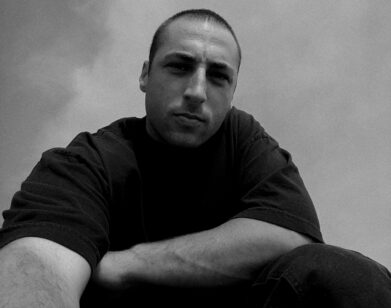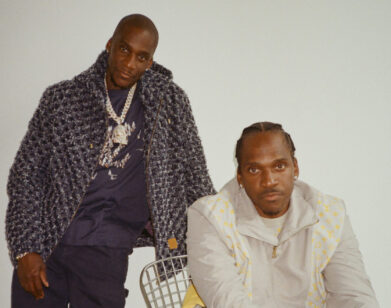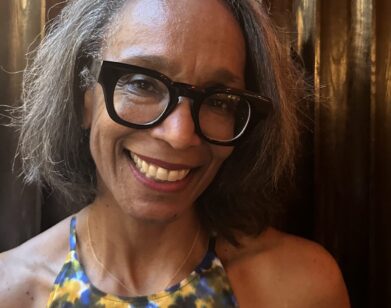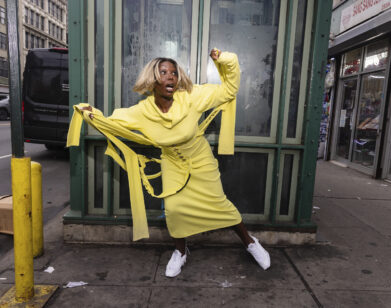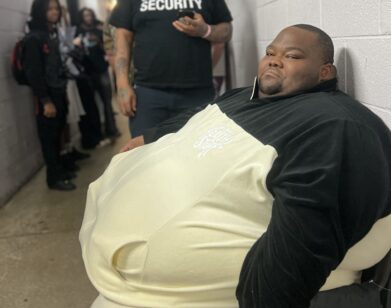Ask a Sane Person: Van Lathan on the Difference Between Racial Justice and Racial Equality
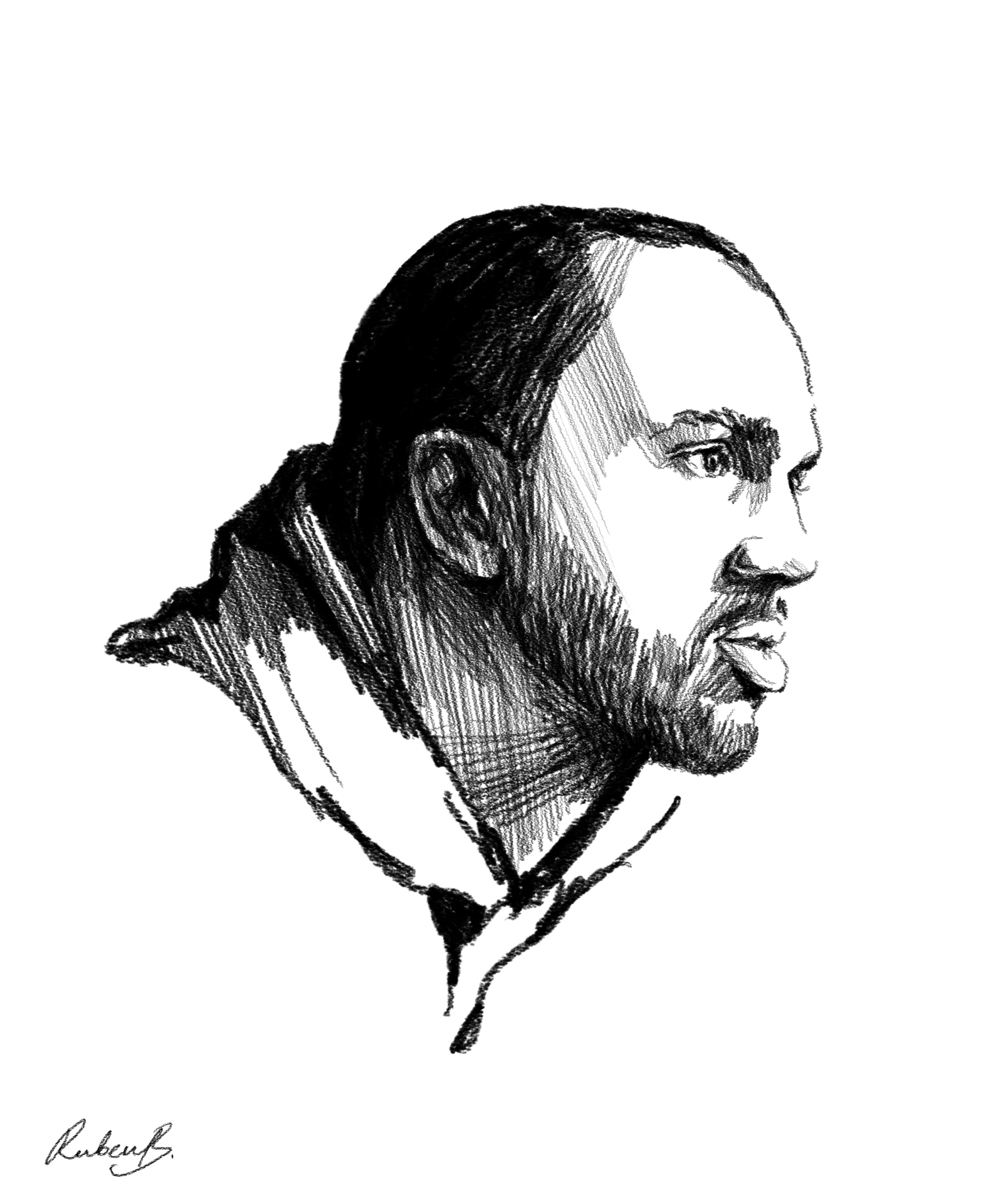
After leaving TMZ, where he famously argued with Kanye West over the rapper’s comment that American slavery was a “choice,” Van Lathan joined The Ringer, where he currently pulls double-duty as the host of two of their newest and most urgent podcasts. The outspoken Louisiana native can be heard breaking down the intersection of Blackness and sports, culture, and politics with Rachel Lindsay on Higher Learning, and deep-diving into every episode of The Wire with Jemelle Hill on Way Down in the Hole.
———
INTERVIEW: Where are you and how long have you been isolating?
LATHAN: I’m in Los Angeles, and I’ve been isolating since around March 13. Well, If I’m honest, I’m in what I call “Isolation Plus,” which is isolation with benefits. I won’t go to any mass gatherings, but if I’ve known you long enough, I might stop by your crib and have a socially distanced chat, or look at the wall together as we alternate panic attacks.
INTERVIEW: What has this pandemic confirmed or reinforced about your view of society?
LATHAN: That people saying that decadence killed America are wrong. Decadence and greed haven’t killed America, and that’s because America was never really born. There is obviously a country with a military and a flag, and all of that. But the ideals that we say that country stands for have always been a lie. The real cure to the pandemic was solidarity. For us to care enough about someone else to take best practices to ensure they breathe. Instead we said “Fuck the weak,” almost from the beginning. Gangster capitalism has taught us that the best food available is each other, so at a time when we actually needed to care for the whole over the few, we couldn’t muster it. Don’t get me wrong. Millions of Americans sacrificed greatly, but for the most part, they’ve now been told to fuck off and get back to work.
INTERVIEW: What has this pandemic altered about your view of society?
LATHAN: That there is such a thing as an introvert. There are people who prefer to keep to themselves, but even they need to know that there are other people who don’t need to keep to themselves. Like, I like being at home. But I need to know other people are out. I’m not sure why, but knowing that we were all, collectively stuck inside together, even though I like being inside, was fucking terrifying.
INTERVIEW: What is the worst-case scenario for the future?
LATHAN: That a vaccine doesn’t come soon. We don’t have the social discipline to weather this for long. If we don’t get a vaccine or a slam-dunk treatment option soon, Americans will be faced with choosing between the life of their elderly or immunocompromised neighbor or going to Disneyland. And they will choose Disneyland. This will lead to a psychological civil war that will exacerbate the divisions in us we’ve never given a shit about addressing. The whole thing could fall apart, especially as the magical elixir, money, starts to disappear.
INTERVIEW: What good can come out of this lockdown? Are there any reasons to hope?
LATHAN: Well, we got some fantastic commercials. It’s great to know that State Farm and Burger King care about lil ol’ me. In fact, everyone cares. Everyone with advertising dollars cares. Every commercial told us, “In these uncertain times, nothing reminds you of the good times like the crisp taste of Old Milwaukee Light.” I really enjoyed that. But the real lesson, the most evident reason for hope, is in one term: “Essential.” We’d lost respect for what that word means. More specifically who that word means. Are late-night hosts essential? Are podcasters and blowhards like myself essential? Fuck no. We’re informative at best, and distractions at worst. Essential are the people who keep this country breathing and fed. They went to work in a battle zone while everyone else was on Zoom, and they can’t even get an extra $1,200 bucks without a fight. We learned that Americans are what makes America whatever it is, and hope for the future is in them. People must matter. The hope is that there’s been enough death and dysfunction for that lesson to be learned.
INTERVIEW: What has been your daily routine during this time?
LATHAN: I wake up and watch Bassmasters on YouTube. Then I work out. Maybe a podcast or two. Then it’s time for Madden. I Madden-it-up until my fingers go numb, then I read. After that it’s really time to go to sleep. I’m 40, and I care about Madden so much. I’m in a couple leagues with some NBA guys. They’re shockingly good at the game. I lose about 93 percent of the times I play, but I’m getting better. It sounds stupid, but getting better at something has been incredibly good for my mental health. I’m not sure why. By the way, Bassmasters is the most soothing thing to watch on TV. These guys are almost certainly Trump supporters, but for the moment all they care about is catching bass. They are fucking bass-crazy bastards. They kiss the bass, they fret over the bass, they praise the bass. And they do it on beautiful lakes. I love it.
INTERVIEW: Describe the current state of your hair?
LATHAN: All fucked up, obviously. I’m cutting it myself. The pandemic has reminded us that to a degree we’re all unattractive. And I’m here for that.
INTERVIEW: On a scale of 1 to 10, what level is your level of panic about the current state of the world?
LATHAN: Eight, but I’m Black and paying attention, so I’m the wrong guy to ask. It’s always an 8. It was an 8 when Obama was elected, it was 8 when Trump was elected. It actually could be higher, it’s only 8 because in 1837 I know it woulda been fucking 12, and I can’t play my ancestors like that. I was flirting with like 6 around 2011, but then we lost Trayvon the next year, the eternal 8 was born. So like 8.
INTERVIEW: Do you think there is hope for true racial equality in the United States? What do you think is the first step in that goal?
LATHAN: I think a better goal is racial justice. I think true racial equality, if possible, is generations away. Racial justice is different. All that demands is accountability. Black Americans know who they want to be in this country. All that most of us are asking is that America stops standing in the way. (As soon as I said that, a number of people reading this bristled. That’s the problem. If you don’t think that America, in the form of systemic white supremacy, has intentionally stood in the way of Black progress then you’re fucking stupid, either intentionally or on accident. Fix that, please.) Anyway, racial justice just demands that when someone crosses Black Americans along racial lines, that there is a penalty. That alone empowers people. You can’t be empowered unless you’re safe. You can’t be truly safe unless you can hurt the people who want to hurt you. So, for right now, I’ll take justice. What we build for ourselves will be equal, if not better. This justice is non-negotiable, by the way. We’ll have our justice, either inside courts and banks and workplaces, or outside on the streets. America will have to decide.
INTERVIEW: How can America work to ensure more equality and justice on a day-to-day level?
LATHAN: Listen to Black women. Well, besides one. But yeah, generally listen to Black women. They have plans and agendas and all kinds of great ideas on how to affect environmental justice, social justice, to fix workplaces and all kinds of stuff—but no one ever listens to them. So they just end up doing this work in anonymity, and mostly for free, dodging shrapnel from in and outside the community. If America has a future, Black women need to have a prominent place in leading.
INTERVIEW: Do you think protests are effective tools for changing the system? How does it make a difference in the long term?
LATHAN: They are incredibly effective. They disrupt the flow of society. Societal norms exist to pacify people. When they’re disrupted, it signals that there are some who’d rather anarchy than silent slavery or loud oppression. That’s scary. It’s scary to think someone would choose protesting over partying, especially if you’re relying on them partying to pacify them. That’s why this mattered, of course—because there were no parties to speak of. But protesting brings people together for a common cause and makes them believe solidarity is possible. You need to know someone else is as fed up as you are. The more people protest, the more the corporations will know that there’s enough of them to affect the bottom line, which is all they really care about.
INTERVIEW: How do you personally channel your anger? Do you find anger to be a useful emotion?
LATHAN: Fuck yeah, it’s useful. The biggest mistake I ever made was letting White America take my anger. The lie of the “Angry Black Man” muted me for a time, making me think I had to react rationally to irrational situations. Like, who can react rationally to watching a man call for his mother as he dies with the state’s knee on his neck? I’m supposed to see that, and not rage, so that America feels better about me? Less threatened by me? So I then take all that emotion, from aggression both micro and macro, and eat it myself? Give it to my woman? Give it to my community? Give it to my own body in the form of a crippling panic attack or substance abuse issue? No. Be angry. Be loud with your anger. Be focused with your anger. Personally I channel mine through solutions and exercise.
INTERVIEW: Who are the young leaders of the moment that you are inspired by?
LATHAN: You said young, so I’m just going under 40 here: George Johnson, Brooke Obie, Phillip Agnew, Frederick Joseph, Johnetta Elzie, Miski Noor, Chanelle Helm, Kimberly Jones, Tiffany Dena Loftin, Blair Imani, Patrisse Cullors, Noname, Alicia Garza, Tef Poe, 19 Keys, DerrickGraceTwo, Nessa, Colin Kaepernick, Tamika Mallory, Mysonne, and, of course, Brittany Packnett and DeRay Mckesson. None of these people is perfect in ideas or execution at all times, but they’re working. Also Bakari Sellers on the political side of things. Plus my personal spiritual advisor Brian Randall Lee.
INTERVIEW: What’s the next step after protests in the streets? Where does the righteous rage go?
LATHAN: It goes to corporate America and to Capitol Hill. If you believe in change, then pay for it. Make it law. Anything else is lip service.
INTERVIEW: Do you work best alone or in a group? Can you protest from home?
LATHAN: It’s either or for me, but I love feeling the energy of the people. I’m not sure you can protest from home. I mean, not everyone has to protest. Everyone has different jobs here. Some people need to fund the movement, some need to inspire it, and some need to be foot soldiers for it. That’s something else we need everyone to understand. Stop asking for homogeny of expression when it comes to these things. Just get involved. People can get involved in a lot of different ways.
INTERVIEW: Americans tend to find the topic of race uncomfortable. How do we start the conversation and address it directly?
LATHAN: It’s uncomfortable to talk about cancer, too, but if you don’t talk about it, it kills you, so grow the fuck up. Discomfort is a poor excuse for death, and quite frankly I’m sick of hearing it. It was pretty uncomfortable being jacked up by the cops at 15 when I was standing in my driveway looking at homework. I bet Sandra Bland was uncomfortable in her last moments. Breonna Taylor, too. We don’t need comfort, we need bravery. People brave enough to deal with their shit. The way you start the conversation is to start it. Don’t feel the need to coddle adults. FUCKING TALK ABOUT IT. LOUDLY LIKE THESE CAPS. I’m sick of this shit.
INTERVIEW: What thinker have you taken comfort in of late and why?
LATHAN: Easy: Cleo Wade, Devi Brown, and Natalie Manuel Lee. Three amazing women who make you feel like it’s all going to be okay. Soothing but unflinching. We need some positive light-givers in there when things look and feel dark.
INTERVIEW: If 2020 were a song, which song would it be?
LATHAN: “400 Degreez” by Juvenille. Don’t ask me why.
INTERVIEW: Which (admittedly totally unqualified) celebrity would you trust with the planet’s future?
LATHAN: C’mon guys.
INTERVIEW: If you could stop time at one particular moment in your life, which moment would it be?
LATHAN: I’m not sure what this question means. But probably prom night 1998. 1998 was a magical year in life. If anyone wants the prom night story, DM me and I’ll tell you. It was a magical, magical night that involved lots of things that I shouldn’t have been doing. And a pair of Timberlands.
INTERVIEW: What’s one skill we should all learn while in quarantine?
LATHAN: One grooming thing that you didn’t know. Like cutting your hair or doing your own nails. Just try it. So what if you look off for a little while, you ain’t got nowhere to be. Plus, if you do learn, you might save yourself some scratch during the crippling depression yet to come.
INTERVIEW: What does our future as a nation look like?
LATHAN: It’s a bright as we’re willing to work for. We’re on the Titanic. The only difference between us and them is that we can see the iceberg. There’s a big iceberg of racism, income inequality, environmental catastrophe, and patriarchy that’s staring us right in the face. We can turn for sure, but it’s going to take more than just the guys driving the boat. Everyone is going to have to grab an oar. Everyone is going to have to pull, or at least most people. We have to be angry, dedicated, brave, and resolute. If we hit the iceberg, we’re done forever. Believe that.
INTERVIEW: What prevents you from giving up hope in the human race?
LATHAN: Little Black babies. I want one. They are amazing. They look like little pieces of obsidian stardust. This is the part of my life when I just want to break some of the cycles I was caught in. I watch videos of little Black babies and I get inspired by their innocence and honesty. I want my kids to have innocence and honesty for as long as possible. And they can’t have that in survival mode. So we gotta change this shit fast.
INTERVIEW: Who should be the next president of the United States?
LATHAN: It should be Bernie Sanders. But I’m hoping with everything in me that it’s Joe Biden, and I will work to effect that outcome.

